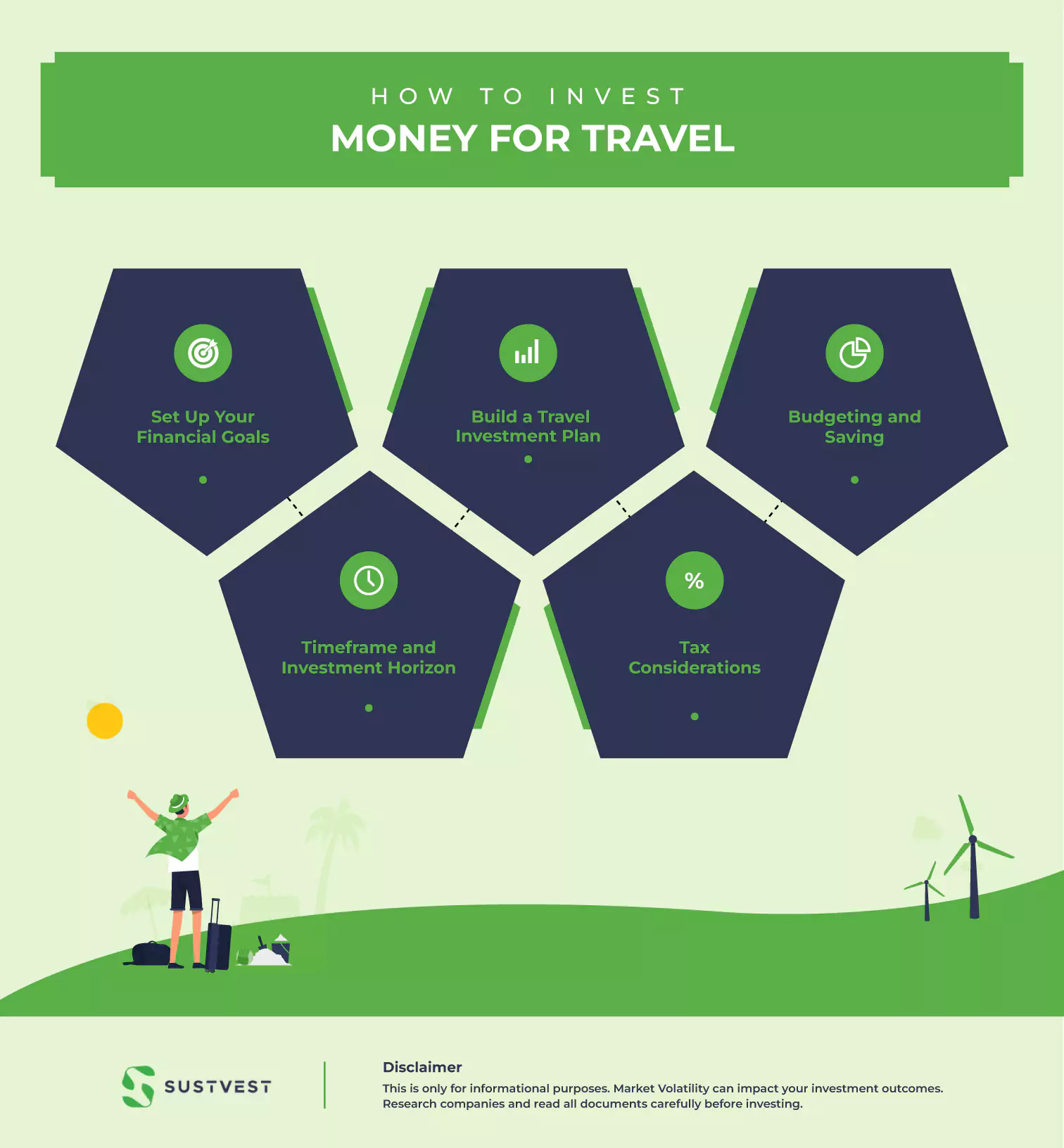Do you often find yourself dreaming of far-off places and exciting adventures? Travelling the world is a dream, but it may be expensive. However, smart financial preparation and clever investments can make your vacation plans come true.
Instead of just letting your money sit in a regular savings account, you could explore investment options that grow your funds over time.
Two popular choices for beginners are mutual funds and bonds.
Mutual funds are like baskets of different investments managed by experts, while bonds are loans you provide to governments or companies in exchange for interest payments.
Aside from well-known investment avenues like mutual funds and bonds, there exists a plethora of other investment options that can potentially fund your travel dreams.
The question then arises — How can you utilise these financial tools to make your money work for your travel aspirations?
This article will explain and illustrate some clever investments for travel, including mutual funds and bonds. We’ll show you how they can help you save for vacations and start your investment path.
Let’s see how to invest money in travel.

How to Invest Money for Travel
Investing money for travel is like planting seeds for your future adventures. With the right strategies, you can watch your money grow and fund your wanderlust.
Here’s a guide on how to invest money for travel:
1. Set Up Your Financial Goals
Setting financial goals is like planning a roadmap for your travel dreams. It’s about determining how much money you need, where you stand financially, and when you want to travel.
Let us proceed with a detailed analysis:
- Know Your Travel Budget: Understand expenses for your desired trip – flights, stays, activities. Calculate the total funds needed to shape your investment strategy effectively.
- Check Your Money Situation: Evaluate how much money you’ve saved and factor in your usual expenses to see how much you can comfortably set aside for travel without straining your finances.
- Pick a Timeframe: Pick when you travel. Choose if it’s soon (short-term) or later (long-term). This helps shape how you save and invest in your adventure.
Remember, setting financial goals is about understanding your travel dreams and making a plan to turn them into reality.
As you plan your financial goals for travel, why not consider the broader scope of financial planning? Learn more through Investing ₹ 5000 Per Month: A Guide to Financial Freedom.
2. Build a Travel Investment Plan
Once you have set up your financial goal, now you are ready to build a travel investment plan.
Building a robust travel investment plan is a crucial step in ensuring your financial resources align with your wanderlust.
As we are in the middle of the year 2023, let’s seize the chance to plan for an overseas vacation or within India. Explore some of the best investments that pave the way for your dream trip in 2023-24.
Let’s discover some investments to make this goal a reality by considering options that align with your travel aspirations.
1. Equity Mutual Funds
Equity mutual funds in India invest in stocks, potentially offering high returns over the long term. While they can be volatile in the short run, they present an opportunity for capital growth.
Ideal for those planning to travel in the distant future, equity funds require careful consideration of risk tolerance and investment horizon due to market fluctuations.
2. Debt Mutual Funds
If you are thinking about how to invest money for travel, consider debt mutual funds. These funds invest in fixed-income assets, like bonds and money market instruments, offering stability and lower risk compared to equities.
They’re suitable for short-term travel plans due to consistent returns and reduced volatility.
3. Company/Corporate Fixed Deposit
Company or corporate fixed deposits (FDs) are different from bank FDs. Financial institutions like NBFCs and HFCs offer them and often offer higher interest rates.
However, it’s important to be cautious before choosing corporate FDs. They have more risk compared to bank FDs. This is because corporate FDs don’t have the same deposit insurance (like DICGC’s coverage of up to ₹5 lakh) that bank FDs enjoy.
4. SIPs (Systematic Investment Plans)
SIPs allow you to invest in mutual funds in smaller, periodic instalments. This can be a disciplined way to invest in equities without a large upfront investment. SIPs can help you ride out market volatility over time.
5. Stock Market
If you possess sound knowledge of the stock market, individual stocks might be an avenue worth exploring.
Investing in the Indian stock market, for example, means buying shares in specific companies, making it an engaging way to put your money to work.
While potentially offering high returns, it comes with risks due to market volatility. Thorough research and understanding of company fundamentals are crucial.
Stock investments require careful consideration and due diligence to balance potential gains with the possibility of losses.
3. Budgeting and Saving
Budgeting and saving play a pivotal role in turning travel dreams into reality. Creating a dedicated travel fund is the cornerstone of effective financial planning for your journeys.
Start by evaluating your current spending habits to identify areas where you can cut back. Allocate a portion of your income specifically for your travel fund and consider setting up automatic transfers to ensure consistent contributions.
Trimming unnecessary expenses, such as dining out or subscription services, can significantly boost your savings over time.
By maintaining a clear separation between your travel fund and daily expenses, you’ll be less tempted to dip into it for non-essential purchases. Additionally, adopting an economic mindset can help you stretch your travel budget further.
Remember, small sacrifices today can lead to incredible travel experiences tomorrow. Stay committed to your budget and savings goals, and you’ll be well on your way to accumulating the funds needed to explore the world.
4. Timeframe and Investment Horizon
When planning to invest money specifically for travel, it’s vital to grasp the importance of time frame and investment horizon.
The nature of your travel goals, be it short-term getaways or long-term adventures, will heavily influence the approach you take to investing.
- Short-term Travel Goals: These typically involve trips planned within the next 1 to 3 years. Short-term travel goals could include a vacation, a destination wedding, or a special anniversary getaway. Since the time frame is relatively tight, your investment strategy should prioritise liquidity and stability. Opt for investment options that offer quicker access to your funds without exposing them to too much market volatility.
- Long-term Travel Goals: If your travel plans are set for 3 years or more in the future, you have the advantage of a longer investment horizon. This allows you to consider more diverse investment options, including those with higher potential returns but potentially higher risk. Long-term goals might involve more extensive travel, such as a sabbatical or a world tour.
Adjusting investment strategies according to your travel goal’s timeframe is vital. For short-term goals (1-3 years), prioritise stable options like high-yield savings or short-term bonds to ensure liquidity and mitigate risk.
Long-term goals (3+ years) permit diversification into stocks for higher returns, benefiting from compounding.
5. Tax Considerations
Consider the tax implications of your trip investment options. Knowing how taxes affect investment returns might help you optimise your gains.
Different types of investments are subject to varying tax treatments. It’s essential to be aware of how your investment returns will be taxed to avoid unexpected tax liabilities.
Here’s a glimpse at some general tax factors to keep in mind:
- Capital Gains: These are the profits you make when selling investments for more than their purchase price. Tax rates differ for long-term and short-term gains.
- Dividend Income: Some investments, like stocks, may yield dividend income. Taxes may apply depending on your income level and the dividend’s nature.
- Interest Income: Investments in bonds and similar fixed-income assets accrue interest, which is taxed at your regular income tax rate.
Understanding these tax factors and applying tax-efficient solutions will help you maximise travel fund growth and minimise the tax impact on investment returns.
Tax regulations can be complicated and changing, so consult a tax specialist or financial counsellor to tailor your plan to your situation.
Want to explore further ways to maximise your investments? Dive into What Are The Investments to Save Tax – A Comprehensive Guide and optimise your financial strategy.

FAQs
Is investing in travel only for wealthy individuals?
Not at all. Investing in travel is accessible to everyone. It’s about making strategic financial choices, even with modest budgets, to gradually build a travel fund over time.
Can I invest in travel if I have short-term travel plans?
Absolutely. For short-term plans, focus on low-risk options like high-yield savings accounts or short-term bonds to ensure your funds are readily available when needed.
What if my risk tolerance is low? Can I still invest in travel?
Fear not. Short-term plans call for conservative investments like high-yield savings accounts or short-term bonds. These options ensure that your funds are easily accessible when the time comes to embark on your journey.
Should I invest all my savings in travel?
It’s wise to maintain an emergency fund before investing. Once you have that safety net, allocate a portion of your savings towards investments, keeping a balance between financial security and travel aspirations.
Wrapping Up
In wrapping up this guide on “How to Invest Money for Travel,” remember that with careful planning, smart investments, and a dash of patience, your dream adventures can become a reality.
By aligning your financial goals and wanderlust, you can create a solid travel fund through diversified investments.
So, take these tips onboard, and when you’re ready to embark on your next journey, remember to put your learnings into action.
As you plan your next journey, consider how green energy might align with your investment goals. Discover How To Invest In Solar Renewable Energy In India And Make A Profit?
For more personalised advice, explore SustVest—a great platform to kickstart your travel investment journey.

Founder of Sustvest
Hardik completed his B.Tech from BITS Pilani. Keeping the current global scenario, the growth of renewable energy in mind, and people looking for investment opportunities in mind he founded SustVest ( formerly, Solar Grid X ) in 2018. This venture led him to achieve the ‘Emerging Fintech Talent of the Year in MENA region ‘ in October 2019.




